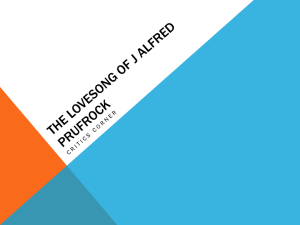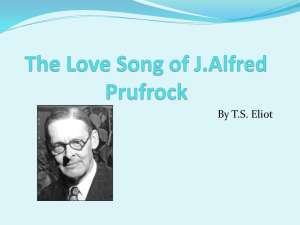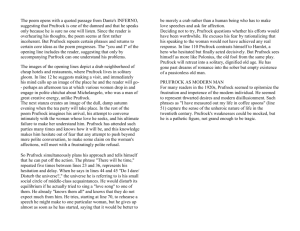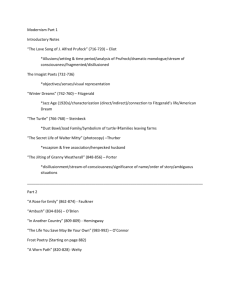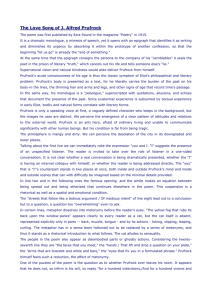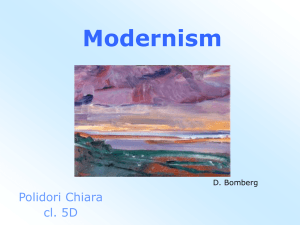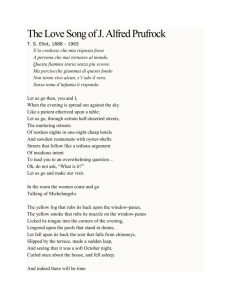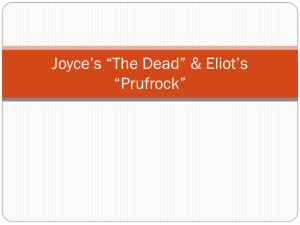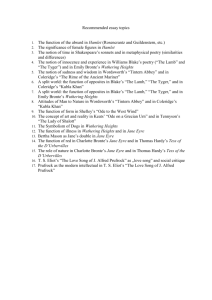`To Be or Not To Be` is a phrase uttered by Hamlet in Shakespeare`s
advertisement
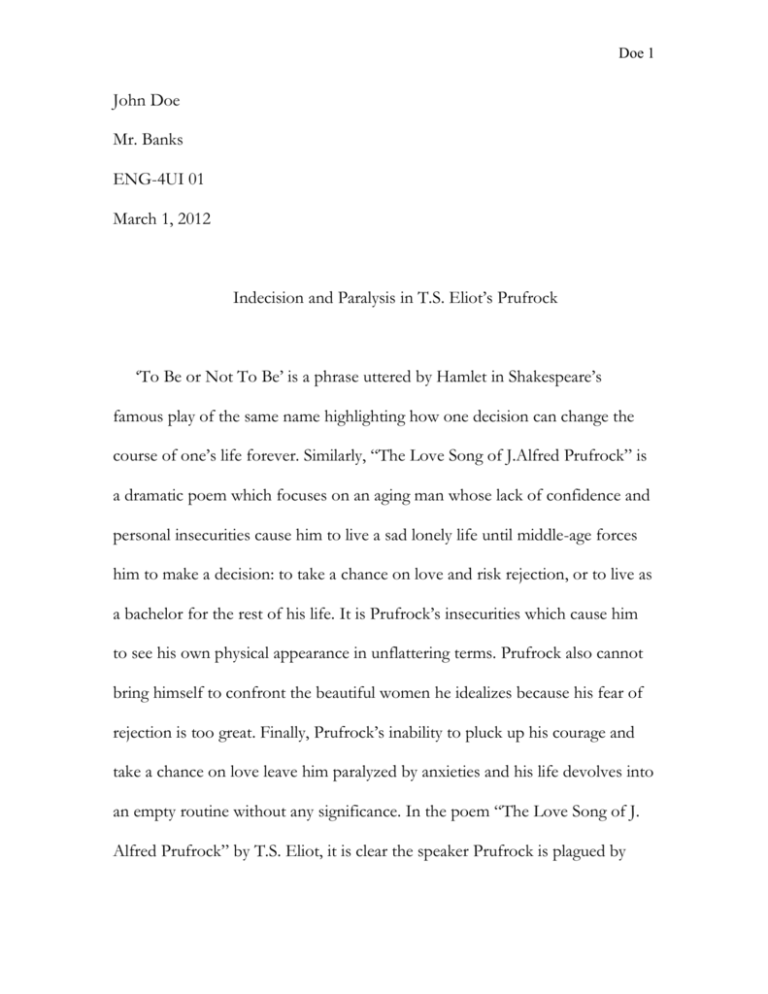
Doe 1 John Doe Mr. Banks ENG-4UI 01 March 1, 2012 Indecision and Paralysis in T.S. Eliot’s Prufrock ‘To Be or Not To Be’ is a phrase uttered by Hamlet in Shakespeare’s famous play of the same name highlighting how one decision can change the course of one’s life forever. Similarly, “The Love Song of J.Alfred Prufrock” is a dramatic poem which focuses on an aging man whose lack of confidence and personal insecurities cause him to live a sad lonely life until middle-age forces him to make a decision: to take a chance on love and risk rejection, or to live as a bachelor for the rest of his life. It is Prufrock’s insecurities which cause him to see his own physical appearance in unflattering terms. Prufrock also cannot bring himself to confront the beautiful women he idealizes because his fear of rejection is too great. Finally, Prufrock’s inability to pluck up his courage and take a chance on love leave him paralyzed by anxieties and his life devolves into an empty routine without any significance. In the poem “The Love Song of J. Alfred Prufrock” by T.S. Eliot, it is clear the speaker Prufrock is plagued by Doe 2 indecision and cannot bring himself to talk to the women he is attracted to due to low self-esteem and personal insecurities. To begin, Prufrock’s over-sensitivity to the passage of time and his inability to change the course of his personal life cause him to criticize his own physical appearance. This is identified early in the poem when Prufrock worries his hair, arms and legs are growing thin (lines 40-43) which leads him to exclaim later: I grow old…I grow old… I shall wear the bottoms of my trousers rolled. (lines 124-125) Here, Prufrock does not see himself as a middle-aged man in command of his life, but instead sees himself only in terms of body parts wasting away as if he is slowly vanishing due to age. He diminishes himself through such observations and literally believes he is shrinking which will cause him to wear his trousers rolled when he is an old man. Thus, Prufrock’s fears of time passing and his own mortality cause him to be overly-sensitive and critical of his physical shortcomings. Other critics have remarked Prufrock’s obsession with aging and his physical appearance feeds his personal insecurities, diminishes his self-worth and is a source of his unhappiness. Michael North in his book The Political Doe 3 Aesthetic of Yeats, Eliot and Pound notes, “The dread questions ‘How his hair is growing thin!’ and ‘But how his arms and legs are thin’ reduce Prufrock to certain body parts”. What North is saying is that Prufrock reduces himself to mere thin arms and legs making it difficult to see himself as a whole person who has the ability to take control of his life. Likewise, time does not change for Prufrock because he says he has “known them already, known them all” (line 48) referring to evenings, mornings, and afternoons as static and unchanging in his life. It is exactly this kind of thinking, on the one hand diminishing his self-worth by criticizing his personal appearance and on the other suggesting life is impossible to change, which sabotages Prufrock and makes him unable to take steps toward happiness. Consequently, this defeatist attiude is the reason Prufrock cannot bring himself to confront the beautiful women he idealizes for he fears he will be rejected by them. He complains to himself in the next section of the poem: If one, settling a pillow by her head, Should say: ‘That is not what I meant at all. That is not it, at all.’ (lines 97-100) Doe 4 This comes after he compares himself to Lazarus and announces he will roll the universe in a ball toward some overwhelming question, which readers might imagine as his asking a woman on a date. However, his confidence collapses and he imagines being rejected by a woman who says he misunderstood her intentions. This theme is picked up again when Prufrock says, “I have heard the mermaids singing, each to each. / I do not think they sing to me (lines 129-130). The critic Michael North states this pessisim causes Prufrock’s unhappiness for he says, “Instead of living life Prufrock feels ‘I have measured out my life with coffee spoons.” Therefore, Prufrock’s negative thinking is a self-fulfilling prophecy which leaves him unable to talk to the beautiful women he adores and causes him to view his day-to-day life as meaningless. Inevitably, such pessimism and avoidance of female companionship leaves Prufrock feeling trapped and paralyzed by a life that has stopped moving forward for him. He uses imagery to develop this idea when he begins to see himself in terms of an insect trapped on a wall by a botanist: And when I am formulated, sprawling on a pin, When I am pinned and wriggling on the wall, Then how should I begin Doe 5 To spit out all the butt-ends of my days and ways? (lines 56-60) Here, Prufrock describes himself like an insect pinned to a wall by eyes of other people which leaves him feeling trapped when, in reality, it his own anxieties which make him feel imprisoned by life, unable to change his days and ways. Because Prufrock is too afraid to take a chance on making himself vulnerable to another human being, the critic J. Hillis Miller in the book Poets of Reality: Six Twentieth-Century Writers says Prufrock “exists in an eternal present, a frozen time” meaning he sees every possible outcome but is paralyzed by his own inaction and indecision. Clearly, not taking a chance on love undermines Prufrock’s confidence and his life devolves into a sad purposeless existence. Ulitmately in T.S. Eliot’s “The Love Song of J. Alfred Prufrock”, it is Prufrock’s own negative thinking which causes his indecision and painful interactions with the opposite sex. Prufrock’s low self-esteem and personal insecurities cause him to see his own physical appearance in unflattering terms. He never talks to the beautiful women he idealizes because his fear of rejection is too great. Sadly, Prufrock’s inability to take a chance on love paralyzes his thinking and thus makes him look at his life as mere routine without any significance. Like Shakespeare’s prince Hamlet, T.S. Eliot’s character J. Alfred Prufock has a tragic flaw which is his indecisive nature for he would rather talk about his feelings than change the course of his mundane life. Doe 6 Works Cited Miller, J. Hillis. Poets of Reality: Six Twentieth-Century Writers. Cambridge, MA: The Belknap Press of Harvard UP, 1965. North, Michael. The Political Aesthetic of Yeats, Eliot and Pound. Cambridge: Cambridge UP, 1991.
